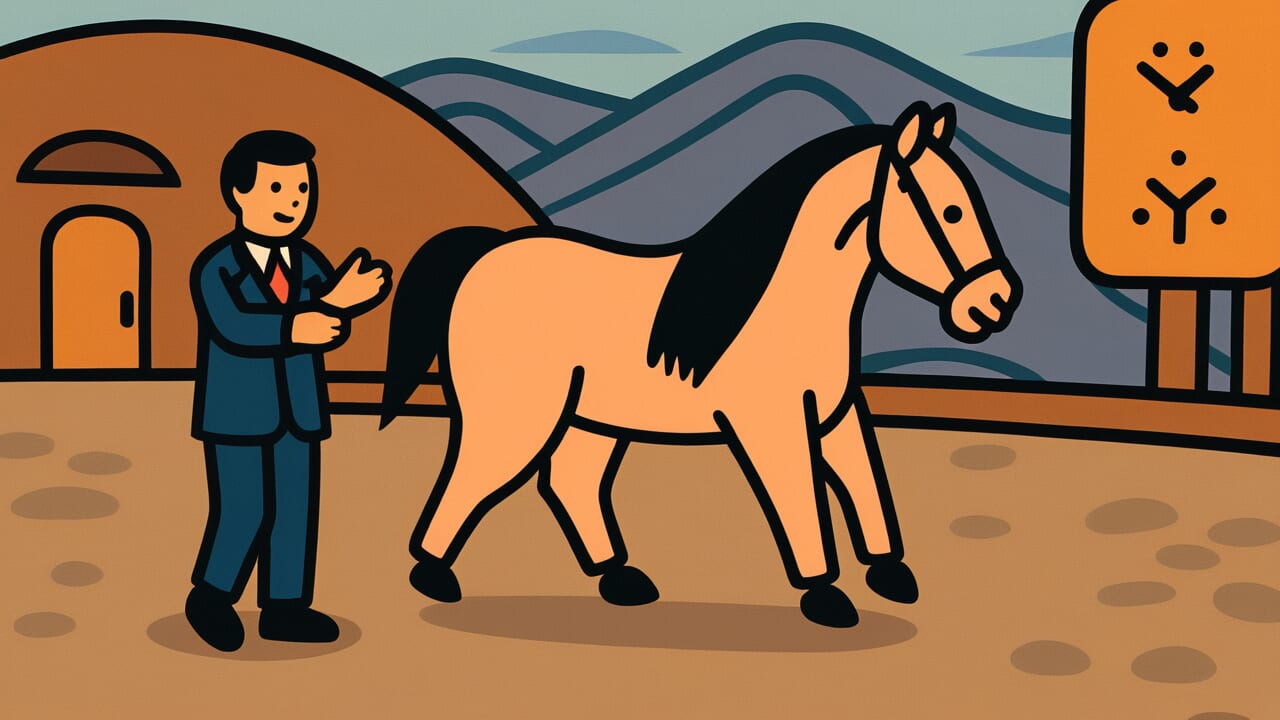How to Read “Even a horse that can run a thousand miles is useless without meeting Bole”
Senri no uma mo hakuraku ni awazu
Meaning of “Even a horse that can run a thousand miles is useless without meeting Bole”
This proverb means that talented people cannot show their abilities without meeting someone who understands them.
No matter how wonderful someone’s abilities are, they cannot get the chance to show their true power without meeting someone who properly evaluates their worth and recognizes their talent.
This expression is used when talented people are buried in obscurity or when they cannot receive proper recognition.
It also emphasizes the importance of people who have the eye to recognize outstanding talent.
Even in modern society, this proverb accurately describes situations where people with real ability are not recognized or lack opportunities.
It teaches us a deep truth: people can only shine when both talent and the eye to discover it come together.
Origin and Etymology
This proverb is believed to come from an ancient Chinese story.
“A horse that can run a thousand miles” refers to an excellent horse that can run a thousand miles in one day. “Bole” is the name of a person in ancient China who was known as an expert at judging the quality of horses.
Bole was a horse appraiser who is said to have lived during the Spring and Autumn period.
The story teaches that no matter how excellent a horse is, without an expert who can recognize its true value, it will be treated as just an ordinary horse.
In fact, even a horse with outstanding abilities might spend its entire life as an ordinary horse carrying heavy loads if no one can understand its potential.
This story came to Japan and became established as a proverb about the importance of recognizing talent.
This expression appears in documents from the Edo period, so it has been used in Japan for quite a long time.
Using the familiar animal of a horse as an example, it teaches us about the difficulty of talented people receiving proper evaluation and the importance of having the eye to recognize outstanding talent.
Usage Examples
- That researcher made wonderful discoveries, but “even a horse that can run a thousand miles is useless without meeting Bole”—he received no recognition during his lifetime
- Her planning skills are genuine, but “even a horse that can run a thousand miles is useless without meeting Bole”—her current boss doesn’t seem to understand her
Universal Wisdom
This proverb has been passed down for so long because it points to a fundamental injustice in human society.
Talent and recognition do not always match. This is a truth that never changes across time and place.
Everyone has the desire to have their value recognized. But in reality, no matter how excellent your abilities are, whether you can meet someone who understands them depends largely on luck.
Many people have suffered from this unfairness.
At the same time, this proverb shows another truth. That is the difficulty of having the eye to recognize people’s worth.
How precious an existence like Bole is! Without people who discover, nurture, and introduce outstanding talent to the world, how many possibilities would be lost?
This proverb teaches us about both perspectives: the difficulty of both the side that wants to be recognized and the side that recognizes.
One of the most essential challenges in human relationships is condensed here.
That is why it continues to resonate with people across the ages.
When AI Hears This
There are many talented people in the world, so why can’t they be found?
This can be explained as a “signal-to-noise ratio” problem in information theory. In other words, the signal of excellent ability certainly exists, but it cannot be detected because it is buried in surrounding noise.
For example, when searching for an airplane with radar, the reflected waves from the airplane are always there.
But when there is a lot of noise like rain, birds, or radio interference, you cannot distinguish the real signal.
Bole is exactly this “high-performance detector that can pick up signals.” He has the ability to recognize patterns invisible to ordinary people and extract the real thing from noise.
What’s even more interesting is the relationship with the observation problem.
In quantum mechanics, the state of a particle is not determined until it is observed. Similarly, talent remains a “potential possibility” until discovered by Bole, and socially it might as well not exist.
Value does not objectively “exist there,” but is “determined” for the first time by an appropriate observer.
Conversely, this means that any excellent talent depends on the performance of the detection system.
The reason a horse that can run a thousand miles cannot run is not a problem with the horse, but a problem with the detection accuracy of the entire system.
Lessons for Today
This proverb teaches us two important things.
First, do not give up even if your talent is not recognized right away. Your value is not determined by whether someone recognizes you.
It just sometimes takes time to meet the right place and the right person. It is important not to rush and to keep polishing yourself.
Second, we should make an effort to become “Bole” ourselves.
Find the good points in people around you, recognize their talents, and support them. How wonderful it would be if we could become such an existence!
Believing in someone’s potential has the power to change that person’s life.
In modern society, with the development of social media and the internet, the means to express your talent have increased.
The possibility of meeting “Bole” is higher than in the past. At the same time, it has become easier for you yourself to become someone’s “Bole.”
Not just waiting to be recognized, but also becoming the one who recognizes. Such a two-way relationship may be necessary in the coming era.



Comments